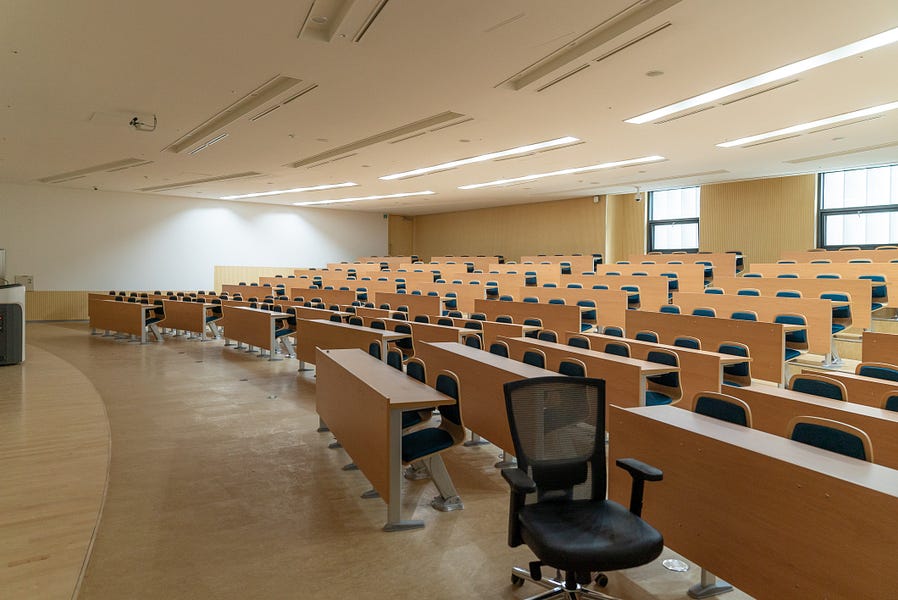Zoom Bomb
Coronavirus derailed college life for the Class of 2020, and Zoom could only help so much.

Photo by Changbok Ko on Unsplash
I can’t stop thinking about college students today. At Mizzou, where I just graduated a semester ago, today marks the final week of classes for the students. And some of those students are about to graduate, and the classes, administered remotely online, will be the final of their collegiate career.
I was sad to graduate this past December, sadder than I remember being for any of my other degrees. College was just a stepping stone, prompting questions of “What’s next?” such that I didn’t even bother to attend my graduation ceremony. Law school was a grueling slog. When graduation rolled around, I was simply sad to leave the amazing batch of friends I’d made along the way.
But graduate school at Mizzou felt like the epitome of right place at the right time for my life. I left Mississippi and the practice of law to pursue journalism; I felt a sense of purpose and mission. That I should feel so at home in Columbia during my studies didn’t always make sense to me. The graduate student cohort was small, and I was the only one interested in magazine journalism. And I was a full decade older than the undergraduate students with whom my practical classes overlapped. It was not an obvious perfect fit, but it was perfect nonetheless.
The two years of graduate coursework flew by, and I experienced so much during my time there, from reporting assignments and part-time jobs to newfound mentors and the joy of creating a magazine each month. When December rolled around, I lingered after my time had come and gone like a ghost. I was on campus, in our newsroom, visiting with editors and professors, eating nearby and going through the motions that had become reflexive from daily repetition for two years; it was clear to any who saw me that I did not want to leave. I drew more than a little comfort simply being in the familiar spaces, knowing everything was about to change. Returning to those places felt like I could stave off the change for just a little while longer. But that strategy, that form of coping, depended on physical proximity; I felt better by going through the motions. Even though I no longer a 9:00 a.m. meeting in the office, there I’d be, sitting and not meeting.
Which brings me back to this week, and those seniors for whom none of that is remotely possible. In December, if asked, I would have said I’d have loved to be coming back for another semester. But not this semester; not this truncated, bastardized version of school. It would have gutted me to graduate and leave under these circumstances, and yet, many of my Mizzou classmates (and countless others in high schools and universities across the country) are being forced to do just that.
Zoom, and its video conference calling power, has endeavored to pick up the slack created by the coronavirus. Class sessions and lectures have moved there, giving the illusion of classes not skipping a beat. And Zoom’s technology should be celebrated, behind the ingenuity and resolve of professors for pivoting to conducting courses remotely and students for participating in them remotely. In an Opinion piece in The New York Times today, Professor Karen Strassler of Queens College and City University of New York, writes:
These Zoom intimacies are often endearing, and at times I welcome the strange, unexpected ways this period of enforced isolation brings about new kinds of closeness with others. I like knowing that this student drinks tea from a big ceramic mug, while that one seems to be good with houseplants. But I’m also aware that these glimpses into my students’ homes violate the implicit contract of the classroom, where students have some measure of control over what parts of their lives outside of school come into view.
But we shouldn’t lose sight of the fact that it is an illusion, and for all its benefits, Zoom robbed these students. Strassler, describing the equalizing effect of a classroom setting, continues:
But that’s exactly why the classroom is so crucial. It is not a space apart from the damaged and unfair world in which we live, but it is a place where students meet each other, first and foremost, as fellow learners. As a teacher, I cannot level a deeply unequal playing field. But within the classroom, my students and I can try to forge a community where we listen to one another with respect, where everyone has a right to the floor, and where students share their experiences because of the trust we’ve built together, not because their private lives are on display via Zoom.
Just because technology makes remote classrooms possible shouldn’t obscure us from the deficit such classrooms represent in comparison to in-person learning experiences. Something, many things actually, are lost in translation, and, for some of us, there’s really no way to replicate that which we need most desperately.
For reasons big and small, academic and unrelated, my heart goes out to you, Class of 2020. While it’s not likely the biggest issue or problem you’ll face in the coming months, I hate that you’re not getting to finish on your own terms.
Read all of Professor Strassler’s article here:
What We Lose When We Go From the Classroom to Zoom | The New York Times
If you liked what you read, please sign up, follow me on Twitter (@CaryLiljohn06) and then forward to friends to help spread the word.